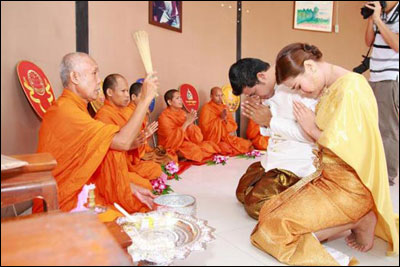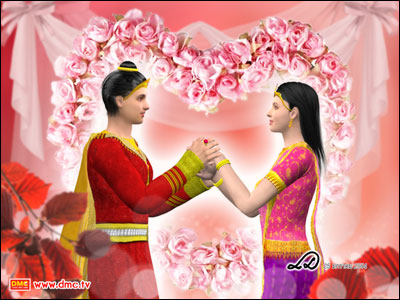How to Manage Family Life #2
How to Manage Family Life
Self-Dependence
An independent person is a person with knowledge, ability and virtue. In summary, this person must have Dhamma for Laypersons.
A person who has the Dhamma for Laypersons (Gharavas-dhamma) must display four regular habits:
1. Habit of Responsibility – Whatever the task at hand, he must do it to the best of his ability, in terms of quality, time, budget, and caring for the quality of mind.
2. Habit of self-training and self-improvement – The study and research in various areas to improve one’s knowledge, ability, and virtue for continuous progress.
3. Habit of endurance – Whatever the task, he is able to overcome all obstacles until the task is complete, regardless of weather, illness, or conflict, as well as withstanding temptations or infatuations of the mind.
4. Habit of sacrifice and generosity – Whatever the task, the group takes priority over the individual. This includes sacrificing one’s own belongings to others who need it most, sacrificing one’s convenience and comfort to take on responsibilities that no one else wants to do, and eliminating one’s negative emptions to maintain a good family environment. One must sacrifice one’s individuality in this way for the betterment of the group and must have acquired these habits at a young age. Otherwise, others will not be able to depend on him.
Only a person who has dhamma for Laypersons or these four good habits can become a self-reliant person, a good shelter for others and a good family leader.
Beauty of Appearance-This is the beauty of our dress, makeup,
lipstick, hairstyle, and apparel in accordance with the times and fashion.
The Four Levels of Beauty
Our grandparents not only taught us how to depend on ourselves, they also taught those who plan on marriage to select the right person to be the mother or father of our children.
Typically, we can only observe physical beauty, not the deep inner beauty of the mind. But our grandparents also taught us to look for the deep inner beauty of the mind. They placed beauty into the following four categories:
1st Level: Beauty of Appearance-This is the beauty of our dress, makeup, lipstick, hairstyle, and apparel in accordance with the times and fashion. It is external beauty that soon will go out of season or will no longer be preferred. This beauty can be purchased or borrowed from others.
2nd Level: Beauty of Body – This is the beauty of the body in terms of our figure, skin, face, hairstyle, fingers, etc. It is individual beauty that can not be purchased or borrowed from others. It does not last and will deteriorate with age. It is not a guarantee of whether a person is good or bad.
3rd Level: Beauty of Manners – This is the beauty of bothe appropriate speech and action towards others. This includes being courteous, modest, respectful, polite, cheerful and friendly to others. However, if these manners are not truly from their heart, it is considered insincere. There are proverbs that warn, “Sweet words are more devastating” or “Sweet beginning, bitter ending” or “Sweet mouth, sour bottom.”
4th Level: Beauty of Mind – This is the beauty of the virtue within a person, which can be expressed through the many aspects of all the responsibilities that person has. We can measure how responsible a person is through these three fundamental aspects:
1) Use of the four requisites, which are clothing, food, shelter and medicine.
2) Daily activities
3) Job responsibilities.
By observing a person’s habit through these three aspects, we can evaluate whether a person is quite responsible or negligent. Only a responsible person can have a beautiful mind and morality. This especially applies to a person who possesses Dhamma for Laypersons, which is composed of truthfulness, self-discipline, endurance, and sacrifice.

Importance of a Marriage Counselor
Importance of a Marriage Counselor
The beauty of a person has four levels, but the most difficult level to observe is the Beauty of Mind, since it is all about the morality that a person possesses. To discover that, we need to rely on persons who have experienced the life of a marriage. In other word, having a family also requires a teacher or coach who can give advice on various family issues
In the old days, those who wanted to get married would have an elder to help them with the proposed marriage. Although their services are still in use today, few people know the true meaning and role of an elder.
“An elder” refers to a person who has a high level of virtue and is well-respected by the community.
A person who becomes an elder must be highly virtuous, which brings them great respect by the majority of the people. They have many virtues because their own marriages embodied the four important factors of a marriage:
1) They must truly embrace Dhamma for Laypersons, otherwise they will not be a reliable source for themselves and their family.
2) They must be able to identify another person’s behavior by observing that person through the consumption of the four requisites, their daily activities and their responsibility on the job. Otherwise, they will not be able to find a suitable spouse with great virtue, one that family members will fully accept and respect.
3) They must have a life teacher or a good counselor advising them on marriage and relationships. Otherwise, it is possible that they will not be able to maintain a long relationship.
4) They must be able to train themselves until they can bring their morals to a higher level. Otherwise, they will lack the knowledge, ability and virtue to handle all the duties that marriage will bring them. They must be able to look after themselves and others at the same time. If their virtue is not high enough, especially in terms of generosity and sacrifice for the greater good, they will not be able to follow through and support their families and future generations, and will not be accepted by society at this level.
The elders have such great virtue and are capable of being reliable advisors to children and future generations because they trained themselves and created a foundation for their families based on the four factors mentioned previously.
Therefore, a family or relationship requires an advisor from the point of spouse selection, the duties of a good spouse, in-laws, parents, and relatives, the duties associated with a successful career, to the many duties that arise in a community. In all of these categories, you must have an elder to advise you and point you in the right direction, so that you can always live together as a peaceful family.
Therefore, a marriage cannot be without an elder, or a highly virtuous adult who can advise and discipline the husband and wife’s behavior. Without “an elder,” the family will head in the wrong direction.
Meditation - Related Articles
"> ">
">








